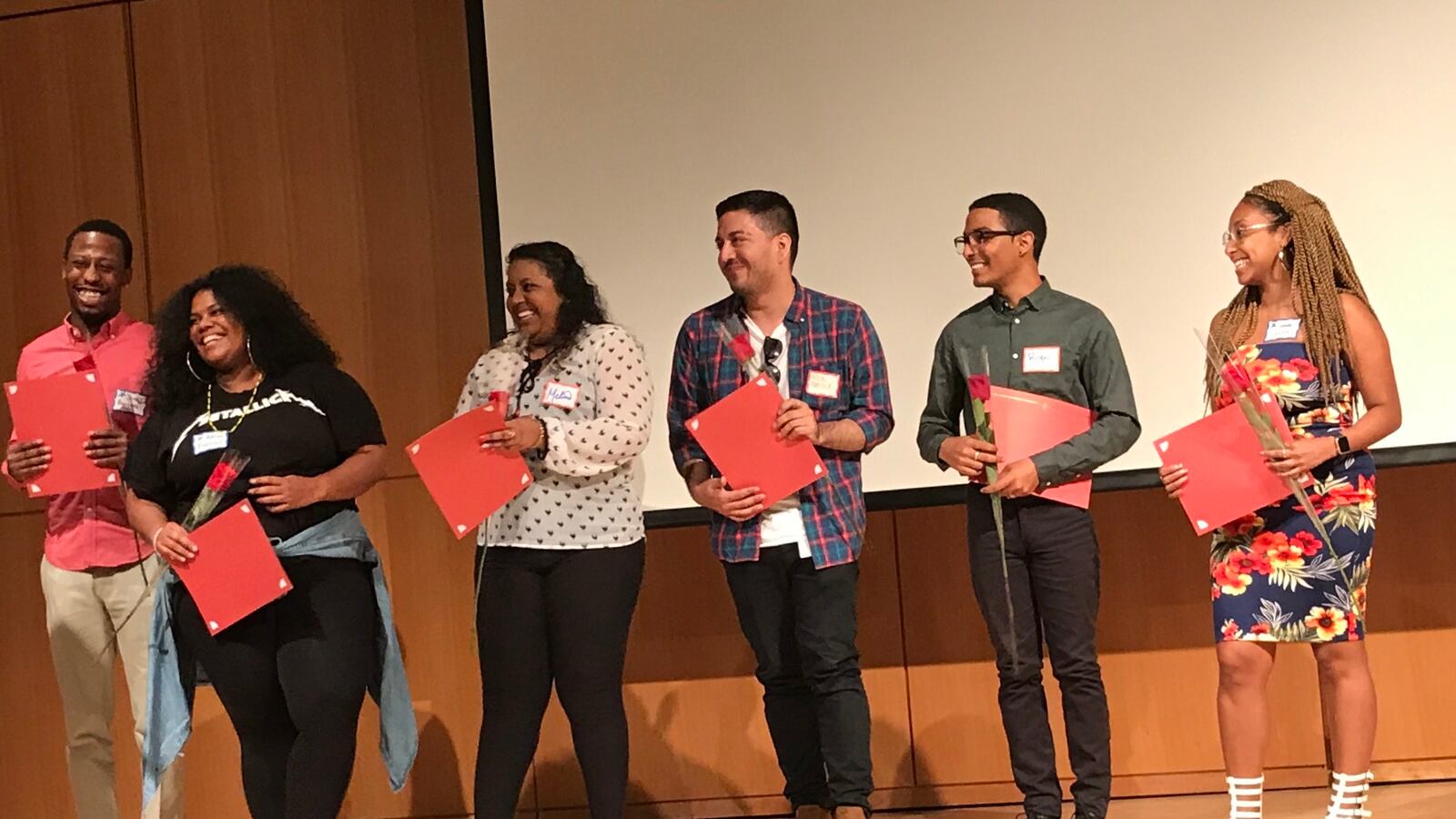Growing up in Brooklyn, Jamel Burgess wasn’t sure why some people went to college and others never seemed to make it.
Now, he’s well aware of the barriers that keep students from higher education, from the big — family strife — to the relatively small, like CUNY’s application fee.
That knowledge has been hard won. Burgess, 25, has spent 10 years working with students hoping to get into and succeed in college, a process that started at the Franklin K. Lane campus when he was a student there getting its Student Success Center off the ground.
That center trains students to help peers through the college admissions process by means of workshops and one-on-one help sessions. The centers now operate in 40 city schools.
Chalkbeat spoke with Burgess, an organizer with the program Future of Tomorrow, just moments before he took the stage as a guest of honor at the 10-year anniversary celebration of College Access: Research & Action’s “Right to College” program. CARA has been involved with the student success center project since its inception in 2007.
In an interview, Burgess explained how he first got involved with youth advocacy and spoke of his own unexpected path to the New School, where he’s working toward a bachelor’s degree, as well as his passions for music, activism, and pizza.
Describe how you first got involved with youth organizing.
I grew up attending the Cypress Hills Collegiate Prep High School. At the time, Future of Tomorrow was recruiting students to come to meetings and basically just saying they had a safe space with food where students could come and learn how to be active in their school community. What really got my attention was the free food part. I dropped into a few meetings and it turned out to be pretty cool.
What motivated you to keep attending the meetings?
The organizer was running political education workshops and talking about things that were taking place in the city and how it impacts us as students and our schools. I found that interesting because in school we didn’t really get to talk about the bigger picture of things. We were always focused on testing, testing, testing and things in a textbook, but this was a different type of education and I really learned a lot. And the pizza was good. So I stuck around.
Something I can remember clearly was looking at how school policy and discipline codes are written, and how youth voices weren’t at the decision table. Young people are impacted by a lot of our discipline code, such as the policy to not have phones in school, the policy to have metal detectors in schools, cops in schools, Regents testing and things like that.
What were the first campaigns you got involved with?
When I started with Future of Tomorrow, the students were already working on the Student Success Center campaign. I sat on a hiring committee with a few other students to interview counselors and identify who we wanted to work at the centers. And we also worked closely with the Urban Youth Collaborative, which is made up of other youth organizations, on a city-wide level. The first centers were then open at Bushwick Campus in 2007 and at the [Franklin K.] Lane Campus in 2008.
Did the program directly impact you?
Yes, I was a youth organizer my senior year and had my own youth leader. She basically talked to me during lunch and at times I would slack off because, honestly, that’s what kids do, kids are kids. She would track me down and make sure I was on top of my stuff and I met with her during lunch or after school.
I remember her forcing me to make sure I checked my email to see if colleges are replying and emailing me back. She was really supportive in my transition to college and I’m really glad I had her. I went on to Queensborough Community College where I studied music production.
I have three brothers and only one of them actually made it to college, my younger brother. A year or two years after he graduated high school, I kept having conversations with him about getting into college and then finally he enrolled into Queensborough Community College. That’s also an important thing to highlight: He got to college a little later but still made it.
We come from the same background, the same circumstances, so I often think what could have happened if he had had a youth leader or student success center.
And why music production? Is that another one of your passions?
I remember telling my youth leader and my college counselor that the only thing I would ever want to study in school was music. I wasn’t really an A student. School didn’t really move me, but music did.
My school definitely did not have music programs. A lot of my music that I got to experiment as a young person was in my mother’s church, but there were a few opportunities in high school, like talent shows, where I got to showcase my music. Everyone knew me as the music guy. I wrote lyrics, I wrote songs, and produced beats.
And I am not back burnering my music now. I’m studying at the New School where I’m basically trying to combine my passions. I’m self-designing a major around art and activism, looking at the ways we can use music and art to create social change in communities.
Where do you see youth advocacy in your future?
I think I definitely eventually want to run my own nonprofit. I don’t know when that’s going to happen. I can keep dreaming it. But I definitely want that. Supporting my community with a strong focus on youth leadership and the arts and advocacy as well. And to continue making great music.

